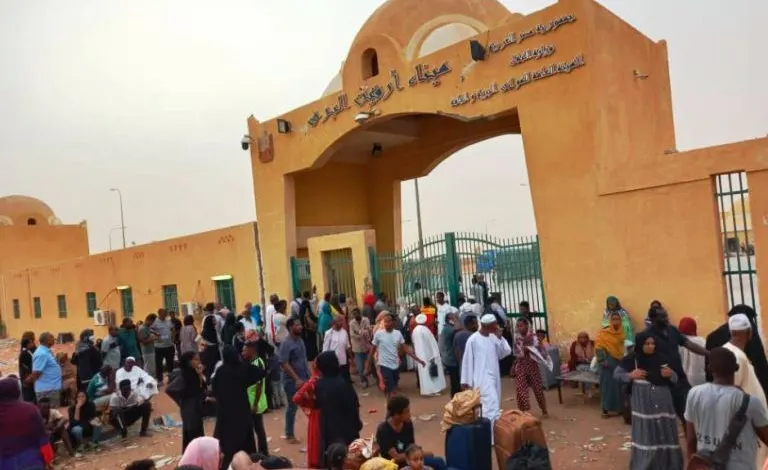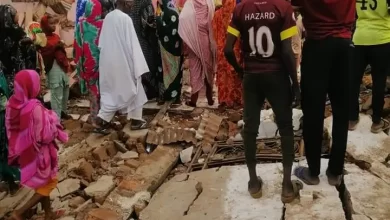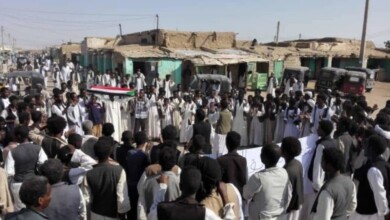Egyptian authorities intensify campaigns to pursue Sudanese on its territory

Egyptian authorities have intensified security surveillance at the train station in Aswan to prevent Sudanese refugees from reaching major cities as part of its measures to limit the flow of Sudanese refugees into the country.
The ongoing war in Sudan -for 19 months- is pushing thousands of Sudanese to seek refuge in Egypt, and despite restrictions on visa services at border crossings and airports between the two countries, the movement of trucks transporting refugees tempts numerous Sudanese nationals to enter Egypt via irregular routes in exchange for money obtained by drivers, most of whom are Bedouin men in both countries.
Munya Hamdallah, a Sudanese activist, told (Ayin) that Egyptian Security authorities monitor the movement of trains between the southern Egyptian city of Aswan and Cairo, asking Sudanese nationals to show their documents, targeting those who arrive in the Egyptian capital without asylum documents in security campaigns aimed at stopping the entry of Sudanese nationals by smugglers’ cars from northern and eastern Sudan to the city of Aswan.
A Sudanese Activist
Munya continued: (The Egyptian authorities have tightened security measures against Sudanese who arrive in Aswan by trucks via desert roads, so we hope you don’t take the risk of traveling to Egypt these days, because the security measures target Sudanese refugees in the city of Aswan, southern Egypt).
The activist pointed out that the Egyptian authorities have been active on the desert roads following the death of Egyptian security officers working to combat human trafficking operations by groups active in human trafficking.
Children in Prisons
Amidst the security campaigns inside cities, the Egyptian authorities arrested the Sudanese comedian Osama Genghis at the Montazah 1st Police Station of Galaa Street, Victoria, the city of Alexandria since October 27th on the pretext of not having any identification papers, according to a Sudanese activist who follows up on the cases of Sudanese nationals in police stations and prosecution offices.
Moazah Al-Amin, who works with a Sudanese human rights group to follow up on the cases of Sudanese in Egyptian police stations in Cairo and Alexandria, told (Ayin): (Among the detainees in the Raml and Montazah 1st Police Stations in Alexandria are “18” Sudanese nationals, arrested under the pretext of violating immigration procedures, some of whom have a card from the United Nations High Commissioner for Refugees).
Sudanese Taking Rough Desert Roads to Reach Egypt and Seek Asylum
The Sudanese people prefer to reach Egypt via cars that transport passengers in irregular ways from the north and east of the country for an amount ranging from ($200 to $300) per person. Upon reaching the southern Egyptian city of Aswan, they request asylum from the United Nations High Commissioner for Refugees (UNHCR), which in turn provides a temporary card until the situation is settled. This period may last for up to half a year, during which the refugees are at the mercy of security campaigns.
Moazah Al-Amin shared: (The Egyptian campaigns began “24” days ago, and are pursuing the Sudanese in the streets and train station). She continued: (We have documented information regarding the imprisonment of 18 Sudanese nationals, three of whom are 12, 13 and 14 years old children, in the Montazah 1st Police Station in Alexandria on the pretext of not obtaining a residence visa in Egypt).
Al-Amin indicated that a group of activists contacted officers in the Montazah 1st, Montazah 3rd and Raml Police Stations in the city of Alexandria. They confirmed that they’re awaiting the response of the Egyptian National Security in regards to the release of detainees before presenting them to the prosecution.
She added: “In the Montazah 1st Police Station in Alexandria, families are prevented from visiting their detained children. They aren’t allowed to bring clothes, food or personal necessities, to the point that families have reached the stage of demanding the release of their children in exchange for their return, including the families, to Sudan.”
Moazah Al-Amin says: “When activists following up on the arrests spoke to the police officers in the aforementioned departments about how to resolve the crisis, the officers confirmed that the Sudanese Embassy refused to deal with the issue, claiming it concerns the United Nations High Commissioner for Refugees, and the latter deals with a sense of bureaucracy, without adhering to the refugee protection clause in Egyptian territory, as if it is complicit with the Egyptian authorities.”
Between Deportation and Imprisonment
Moazah Al-Amin added: “The cost of obtaining a Sudanese passport in the Sudanese Embassy buildings in Cairo is about eight thousand Egyptian pounds, and most refugees don’t have the ability to pay these fees, as most of the people who make the journey by car through the desert from Sudan don’t carry passports; because they prefer to pay money to truck drivers and reach Egypt to obtain a United Nations card.”
Border Crossing Between Sudan and Egypt
According to the Al-Amin, all parties, namely the Sudanese Embassy, the Egyptian Police, the National Security and the United Nations Commissioner for Refugees, are evading responsibility for bearing the financial cost of returning Sudanese refugees, while at the same time we face difficulties when it comes to the Sudanese detainees in the Amiriya and Dakhleya stations on the outskirts of Alexandria.
Egyptian Concern Over the Influx
Approximately, (1.5) million Sudanese nationals sought refuge in Egypt during the war between the Army and the Rapid Support Forces, and although the immigration authorities allowed the influx of refugees in the first weeks of the outbreak of violence, they later imposed restrictions on entry visas since June (2023).
Cairo canceled the Four Freedoms Agreement signed between the two countries since (2004), which guaranteed freedom of movement, residency, work, and property ownership for citizens of both countries, while the Sudanese side didn’t protest these measures.
Egypt is targeting all Sudanese refugees entering its territory illegally, even those who hold a UN card.
Researcher in Migration Issues
The researcher in migration issues Hudhaifa Ahmed told (Ayin): (Egypt has explicitly informed the United Nations that it cannot bear a large influx of Sudanese refugees with the escalation of the war in this neighboring country; because it is suffering from economic pressures.”
Hudhaifa believes that Egypt receives aid from the European Union in exchange for hindering the paths of irregular immigration to the European continent for refugees, blocking all access by combating migration from its source, which is why security campaigns have been active in the desert between Sudan and Egypt.





